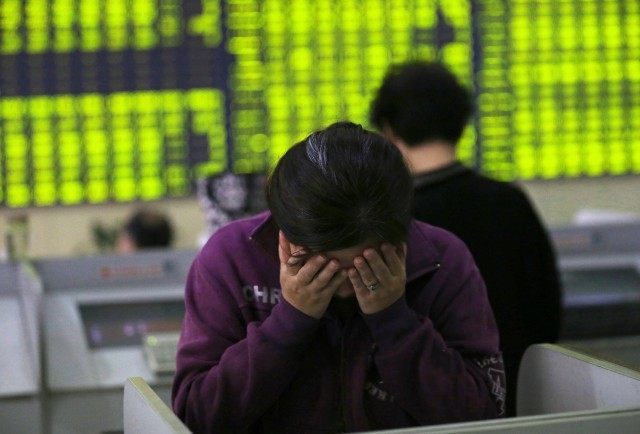China is teetering on the edge of a 1929-style stock market meltdown, and Greece might be about to exit the Euro. China is worried about what the Grexit, or an even larger collapse of the Euro, might do to its house-of-cards stock market. Everybody else is worried about what a Chinese collapse could do to their markets, especially since Western socialists have sold so much of their own nations to China over the years.
The Wall Street Journal notes that China has over a billion dollars invested in Greece, plus $1.61 billion in annual trade, so the Grexit would be an unwelcome jolt of pain to their shaky financial system. China officially favors Greece remaining in the Euro.
The Chinese have been canceling high-profile projects in Greece as its financial situation deteriorates—reluctantly, as they see Greece as an important route into European markets—but the Journal also mentions Chinese investors seeing opportunities in Greece as real estate prices crater, with one analyst noting a 700 percent increase in Chinese interest for Greek real estate and rather uncomfortably declaring, “Greece is the new Detroit.” That’s probably not what Athens wants to hear right now.
Interestingly, the WSJ notes that Chinese buyers aren’t just looking at Greek property for the marvelous scenic views—they’re bluntly interested in living their because Greek residency gets them access to the European Union, and if Greece drops out of the EU, that incentive evaporates. Conversely, it seems likely those Chinese buyers would not share the strong objections of many Greeks to the austerity measures necessary to keep them in the Euro.
The financial circuitry connecting China and Greece could overload the other way, too—a Chinese implosion in the midst of the Greek debt crisis could make an already bad situation in Greece and Europe even worse. One of the fears about China’s situation is that a catastrophic market failure could seriously threaten the Communist Party’s grip on power, and Communists don’t react gently to such threats. One very possible move would be suspending or reversing the free-market reforms that have attracted much global investment to China. Everyone with money in China, or Chinese money in their economy, has reason to be worried.
As if that were not bad enough, the oil markets have unsettled investors, as well. It has not gotten as much media attention as the looming crises in China and Greece, but it could be a factor affecting them both. “Jitters in Europe are likely to fuel a flight to quality in bond markets, meaning investors will buy up U.S. Treasuries,” suggests the Financial Post. “That will push up the greenback. Oil is priced in U.S. dollars. Get the picture?”
By subscribing, you agree to our terms of use & privacy policy. You will receive email marketing messages from Breitbart News Network to the email you provide. You may unsubscribe at any time.
Everyone’s plugged into everyone else’s currency; every nation is both borrowing money and buying debt. Future historians may look back and marvel that it all held together for so long, before facing a systemic crisis that could not be absorbed.

COMMENTS
Please let us know if you're having issues with commenting.